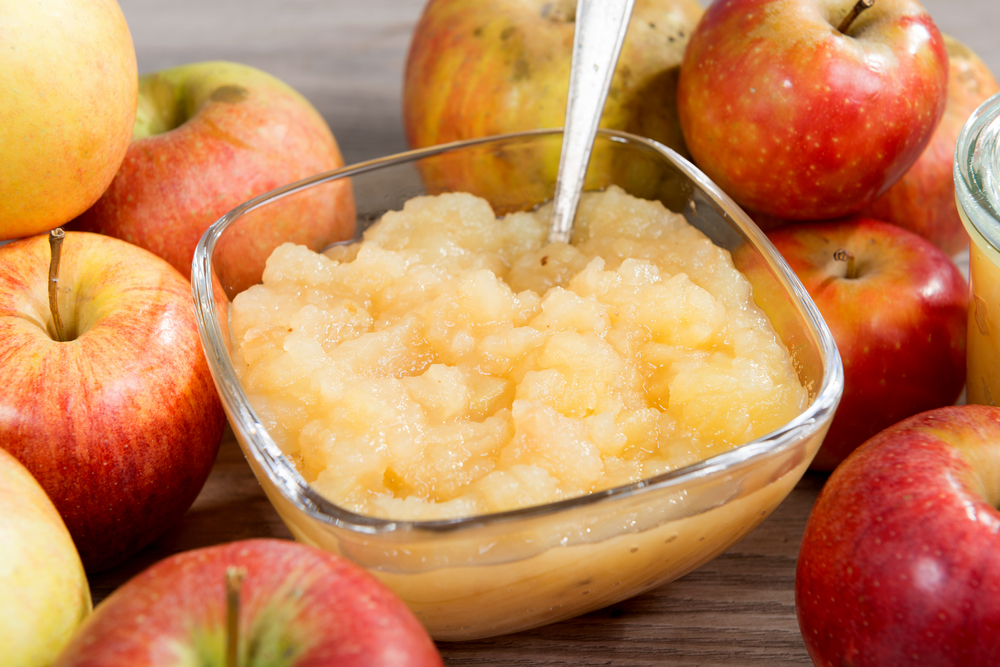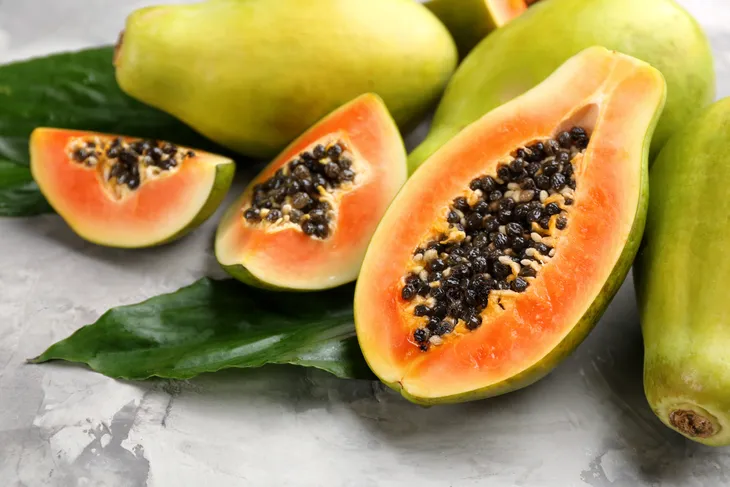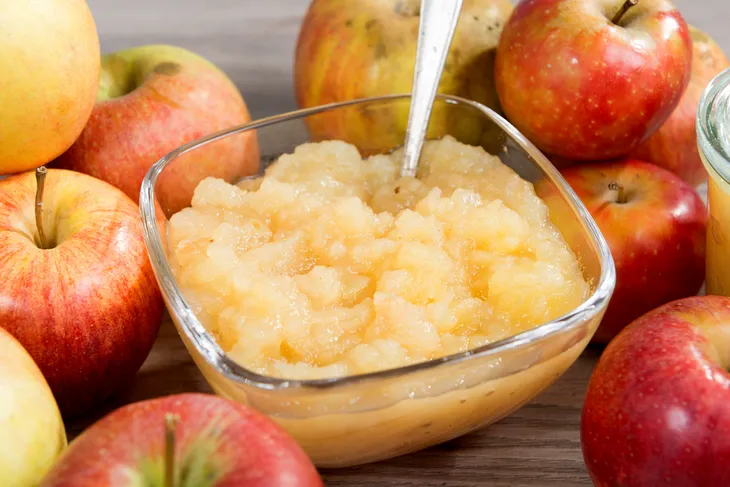- While you may not have an appetite when your stomach is upset, it’s important to try to get calories, minerals and vitamins into your body to help it recover.
- Simple carbs such as rice, toast, and oatmeal are good options that are gentle on the stomach.
- Bananas, avocados and applesauce are other options that can give your body healthy fat, nutrients and calories to fight off the sickness.
We’ve all experienced the pain and discomfort of an upset stomach at one point or another. It may have been from eating too quickly, stress, or simply eating too much. However, the threat of an upset stomach usually isn’t enough to ward us off rich food until we’re doubled over in pain, nauseated, and rushing to the bathroom.
If you find yourself suffering from the pains of a stomach ache, try eating any of these foods that are known to naturally soothe a troublesome tummy…
Want diet & nutrition content delivered straight to your inbox? Sign up for our exclusive diet & nutrition newsletter!
White Rice
Bland foods, such as white rice, are easily digestible when your tummy rumbles with gas and indigestion. As part of the BRAT food diet, which recommends foods like bananas, rice, applesauce, and toast, white rice helps bulk stool and bind bowel movements while putting less stress on bodies suffering from digestion difficulties.
You can either eat white rice plain or top it with some easily digested vegetables depending on how upset your stomach is. Healthline explains that while rice will help your body when suffering, it’s important to add more nutrient-dense food when possible to ensure your body is getting enough vitamins and minerals to heal.
Papaya
The sweet tropical fruit papaya may be a good food choice for when your stomach is upset. This tropical tummy calmer contains papain and chymopapain enzymes which promote balanced digestive acidity. They also help to optimize digestion by easing the body’s ability to break down food proteins.
According to Healthline, some people do not produce enough natural enzymes to fully break down their food, so consuming papain and other additional enzymes may help relieve their symptoms of stomach pain.
Herbal Tea
There’s nothing quite as comforting as a hot cup of tea to the mind or body. According to Healthline, the tummy specifically benefits from herbal brews like liquorice root, peppermint, ginger, and chamomile—all which contain natural anti-nausea properties and soothe gas-related cramps.
Similar to how chicken soup can help with cold and flu, hot herbal tea acts as a natural decongestant. Just be sure that the tea isn’t too hot that it irritates your throat or contains caffeine. Sipping on tea throughout the day can be a great way to stay hydrated and relieve your symptoms.
Peppermint
Natural peppermint-induced food may help to settle a troublesome tummy by easing gas pain, bloating and loosening up tight stomach muscles. This calming effect encourages bile absorption and hastens the digestive process. Peppermint is also thought to help manage IBS and significantly reduce painful symptoms.
Peppermint can be consumed in many forms whether it be through candy, tea, or the leaf itself. Healthline explains that one of the most effective sources of peppermint is peppermint oil capsules. Before you start taking peppermint oil capsules, talk to your doctor or pharmacist to make sure it is compatible with your other medications.
Bananas
Bananas are one of the few foods on the BRAT diet that are recommended to eat when you have an upset stomach. The BRAT diet consists of bananas, rice, applesauce, and toast and is an eating plan that focuses on foods that are easily digestible and don’t upset the tummy. This is because bananas contain pectin, a natural substance that helps stool become more firm.
Healthline explains that bananas also contain high levels of potassium, which can help with the absorption of water and electrolytes in the body.
 Source: Shutterstock
Source: ShutterstockYogurt
Probiotic-rich foods, such as yogurt, are thought to relieve both constipation and diarrhea since they contain live, active bacterial cultures, according to Healthline. While most forms of dairy should be avoided if you suffer from lactose intolerance and are very sensitive to dairy products, plain yogurt contains bacteria that promote healthy gut flora and encourage optimal digestion.
It’s best to avoid heavy foods such as milk, cheese and ice cream, but a little plain, non-fat yogurt may provide your body with the right amount of good bacteria to start the healing process.
Ginger
Nausea and vomiting are common symptoms that come alongside a sore stomach, but ginger may be a solution to help remedy this. You can use ginger as an anti-nausea remedy when you have the stomach flu, however, this natural root (in fresh or powdered form) can be steeped or sprinkled into tea to soothe a delicate tummy.
Ginger is also an effective natural remedy to help women suffering from morning sickness. According to Healthline, a study including over 500 pregnant women found that taking 1 gram of ginger daily was associated with 5 times less nausea.
Applesauce
Another BRAT diet staple, applesauce (akin to white rice, toast, and bananas) contains pectin from fresh apples. Pectin is a type of fiber that dissolvers into water and can help bulk your stool.
When apples are cooked into a smooth sauce, it can help to tame diarrhea, calm upset stomach, and alleviate digestive troubles. Applesauce can provide the body with a boost of energy and provides calories in a way that won’t further upset your stomach.
Chicken Soup
Chicken soup has been a go-to for generations to ease sickness, and for good reason. The warmth of chicken noodle soup is calming and soothing, but can also help reduce congestion and open the sinuses.
Healthline explains that chicken soup is a source of vitamins, minerals, calories and protein, which are important to give your body when you’re in recovery from a sickness. Soup is an easy to eat meal when you may lack appetite and also helps to lower the risk of dehydration which can often occur when you’re sick.
 Shutterstock/Cesarz
Shutterstock/CesarzOatmeal
Oatmeal is another basic food that may be good to eat when you’re sick. Oatmeal is bland and easy to eat, but also provides calories, vitamins and minerals. According to Healthline, one study in rats showed that the fiber in oats may also help to reduce inflammation in the gut.
One thing to be aware of with oatmeal, however, is to avoid buying the high-sugar or artificially flavored options. Instead, try to opt for rolled or steel-cut oats and top with some fruit and honey for added sweetness.
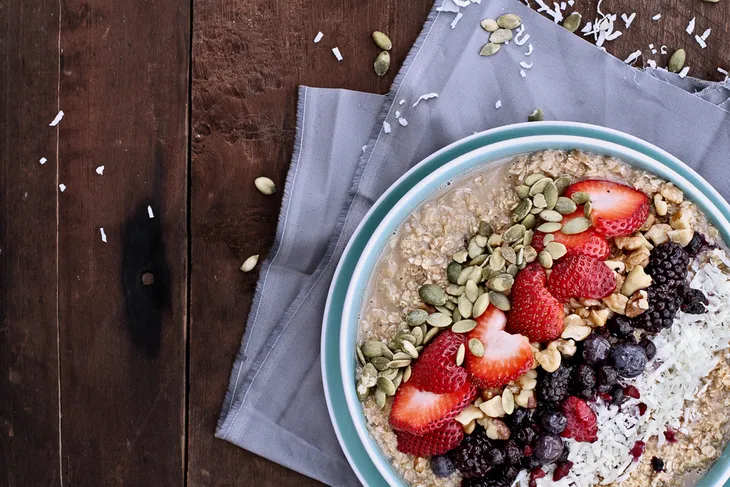 Shutterstock/Stephanie Frey
Shutterstock/Stephanie FreyAvocados
Avocados are a good source of healthy fats and can provide your body with much needed fiber, vitamins and minerals when it’s recovering from sickness. Avocados are also soft and bland, which makes them relatively easy to eat.
Healthline explains that the healthy fats in avocados, especially oleic acid, can help decrease inflammation in the body and support the immune system. A great way to eat avocado is topped on toast for a simple, healthy meal.
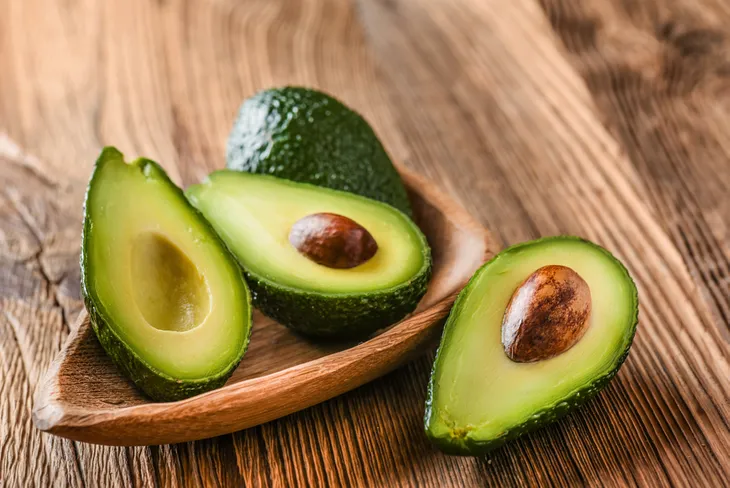 Shutterstock/Krasula
Shutterstock/KrasulaToast
If you’re wanting to keep your food really simple, a good reliable option is a piece of toast. This is a simple, bland carb that can help ease your stomach without triggering any further nausea or pain.
If you’re looking for something really basic, you could always opt for plain toast, however, adding some melted butter or peanut butter might be a nice addition as well. Typically whole grain bread is recommended for optimal health benefits, but in this case the added fiber may upset your stomach, so plain white toast could be a good option.
 Shutterstock/5 second Studio
Shutterstock/5 second Studio